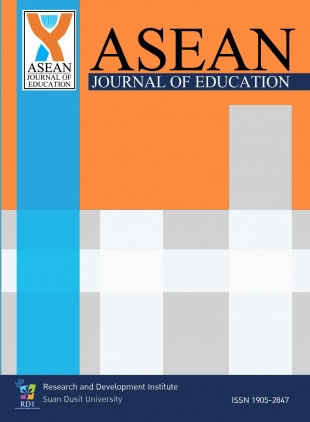Strengthening of Ethic Professional Learning Community: e-PLC in Pre-service Teachert
Keywords:
Professional learning community, Professional ethic, e-PLC, Pre-service teacherAbstract
The research objectives are 1) to create Ethic Professional Learning Community: e - PLC, 2) to evaluate ethics of pre-service teachers, 3) to evaluate teaching abilities of pre-service teachers and 4) to study the pre-teachers and mentors’ satisfaction after using the e-PLC. The population for the study consisted of staff from 7 joint schools consisting of administrators, teachers, pre-service teachers, supervisors and mentors, a total of 442 people. Research tools include 1) the Ethic Professional Learning Community: e-PLC, 2) ethic reflection form, 3) focus group discussion topics and 4) satisfaction questionnaire. The data were analyzed by percentage, average, standard deviation, and content analysis.
The research results show that:
1. The Ethic Professional Learning Community: e-PLC had 6 steps that include 1) communicating, 2) objective setting, 3) small group meeting, 4) planning and designing, 5) lesson studying and 6) reflecting.
2. The ethics of pre-service teachers were found in 5 areas: 1) self code of ethics, 2) professional code of ethics, 3) code of ethics for service providers, 4) code of ethics for professional participants and 5) ethics for society.
3. The teaching abilities of pre-service teachers include 1) knowledge about teaching, 2) teaching strategies and 3) classroom management.
4. The satisfaction of pre-service teachers and mentors was shown at a high level (x̅ = 3.85).
References
Chookamnerd, W., & Sungtong, E. (2014). Model of professional learning development in 21st century in Thai school context. Hat Yai Academic Journal Year, 12(2), 123-134.
DuFour, R., & Eaker, R. (1998). Professional Learning Communities at Work: Best practice for enhancing student achievement. Bloomington, IN: Solution Tree.
DuFour, R., & Eaker, R. (2009). Revisiting professional learning communities at work. Bloomington, IN: Solution Tree Press.
Hord. (1997). Professional learning communities: Communities of continuous inquiry and improvement. Texas: Southwest Educational Development Laboratory.
Ministry of Education (MOE). (2009). Teachers-The heart of quality education. Retrieved 2020, April 10, from http://www.moe.gov.sg/media/press/2009/09/teachers-the-heart-ofquality.php
Ministry of Education. (2008). Core curriculum: 2008. Bangkok: Ministry of EducationTriwaranyu, C. (2017). Creation of professional learning development by collaborative development: Concept and procedure for succeed. Education Journal, 45(1), 112-124.
Na-Songkhla, J. (2010). Teaching and learning design vie electronic system. Bangkok: Faculty of Education Chulalongkorn University.
Ngamkanok, S. (2013). Educational administration for supporting lesson study. Education Journal year, 25(3), 37-38.
Panich, V. (2012). Knowledge and knowledge management. (2nd ed.). Bangkok: Tarueta Publication.
Professional Institute of Education, Office of the Basic Education Commission of Ministry of Education. (2014). Report of the tendency for professional development to improve educational quality prompt 21st century. Bangkok: Professional Institute of Education.
Secretariat Office of the Teachers Council of Thailand. (2005). Educational standard. Bangkok: Teachers Council of Thailand, Ladprao.
Secretariat Office of the Teachers Council of Thailand. (2006). Work manual educational profession. Bangkok: Teachers Council of Thailand.
Senge. (1990). The fifth discipline: The art and practice of the learning organization. New York: Doubleday Sithsungnoen, C., & iGanapathy, M. (2018). Promoting an environment of professional learning community among Thai teachers. Journal of MCU Peace Studies, Mahachulalongkornrajavidayalaya University, 6(3), 1267-1281.
Sergiovanni. (1994). Building community in schools. San Francisco, CA: Jossey Bass.
Stigler, J., & Hiebert, J. (1999). The teaching gap: Best ideas from the world’s teachers for improving education in the classroom. New York: The Free Press.
The Teachers’ Council of Thailand. (2005). Teachers and educational personnel council act. Bangkok: Kurusapa Printing Ladphrao.
The Teachers’ Council of Thailand. (2006). Educational work manual. Bangkok: Kurusapa Printing.
Thompson, S. C., Gregg, L., & Niska, J. M. (2004). Professional learning communities, leadership, and student learning. RMLE Online, 28(1), 1-15.
Downloads
Published
How to Cite
Issue
Section
License

This work is licensed under a Creative Commons Attribution-NonCommercial-NoDerivatives 4.0 International License.
1 All articles will undergo a formal peer-review. A panel of experts from within or without the university will examine the article; approval from a minimum of two experts is required for publication. Revisions posed by the experts must be completed by the research prior to publication.
2 Once published in the ASEAN Journal of Education, the article becomes intellectual property of Suan Dusit University. Duplication, in full or part, requires permission from Suan Dusit University.
3 Excluding errors incurred during printing, author(s) are responsible for the content of their articles.






